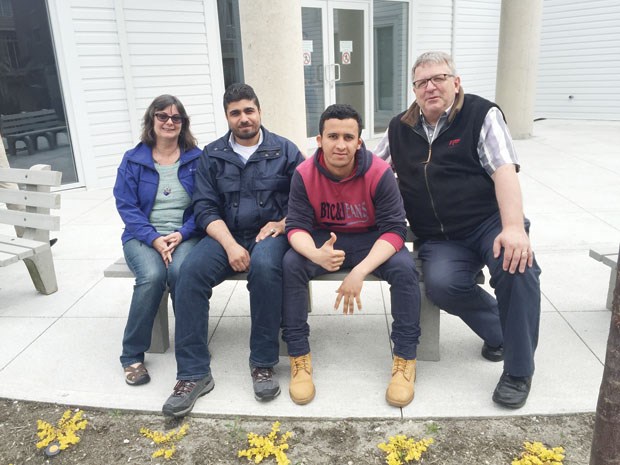South Delta's Syrian refugee families are settling into their new lives in Canada.
"In the beginning, it was hard for them," they say through interpreter Lokman Alshibi. "They're doing really well, they understand life here now."
Mansour and Ensaf Al Nuaimi and their five children, and Mohammad and Nour Al Mohammad and their four children, arrived in Ladner in January. The two families fled Syria after the civil war broke out. They took shelter at a refugee camp in neighbouring Jordan. The camp, which they described as "hell," became home for the next three years.
They arrived in Vancouver on Christmas Day and after spending two weeks at Welcome House, which is run by the Immigrant Services Society of B.C., moved to Ladner.
The children are now doing well in school and the adults are working on learning English.
"They find people really welcoming," Alshibi said. "Really helpful and supportive."
Delta Safe Haven, which has been working to help the families settle into life in Canada, has since welcomed a third Syrian family to Ladner.
Muhanad Azizi and his wife Nariman arrived in Ladner at the end of February. The young couple had been married just a few months when civil war broke out in 2011. They lived in Daraa, in the southern portion of the country, as did the other families. She was going to university studying French while he worked in furniture upholstery.
"It was a perfect life," they said of the time before the war. "Like the same life everywhere in the world. It was really safe."
When war broke out, they moved around Syria and then to a refugee camp in Jordan. They
stayed there for almost a month before moving to the city of Areed after applying to come to Canada as refugees.
They were able to find an apartment and Muhanad found employment but the opportunities were limited. The apartment was small and the job was low
paying. They stayed there for four years before getting the call from the United Nations that they had been accepted to immigrate to Canada.
The couple flew to Montreal before making the move to Vancouver.
Arriving in a new country with a vastly different culture was difficult.
"It was really hard for them to understand these people," Alshibi said.
The couple moved to Ladner on Feb. 22 and settled into a basement suite offered by a local family, which has been helping them adjust. They are working on learning English and adapting to their new life.
The Delta school district is offering English as a second language lessons for the adults and has hired an Arabic speaking staff member to help the parents and children navigate the school system.
As government sponsored refugees, the families all have one year of financial assistance. After that, they are on their own.
While the families are all thankful to be in Canada, and for the assistance offered by Delta Safe Haven, the school district and others in the community, they are not here by choice. Staying in Syria meant facing increasing violence and starvation as conditions in the country worsened.
"It's no choice for them," Alshibi said. "You will die or you will leave the country."
The biggest challenge for the refugees arriving in Canada in learning English, said Rev. Jim Short, who is one of two coordinators for Delta Safe Haven. The small committee has also assembled 40 volunteers to help the families adjust to life in South Delta.
With just one year of financial assistance for government-sponsored refugees, there is tremendous pressure to learn the language that will help them find employment and financial stability.
"To succeed you need to learn English," Short said, noting the current influx of refugees into Canada is the largest since the Second World War.
Last year, the new Liberal government committed to accept 25,000 Syrian refugees. Thousands have already arrived in Canada. In the Lower Mainland, finding accommodations is a challenge, Short said, adding that 300 are still living in motels waiting for a more permanent home and another 1,000 are slated to arrive this year.
Delta Safe Haven has also expanded its scope to help refugees settling in North Delta. Short said there are nine refugee families in that area and the committee reached out to help one family that was struggling with the transition. He said the committee is hoping to see a similar group start up in North Delta.
Delta Safe Haven is still looking for financial donations as well as volunteers, particularly anyone who speaks Arabic.
For more information visit www.deltasafehaven. org.



